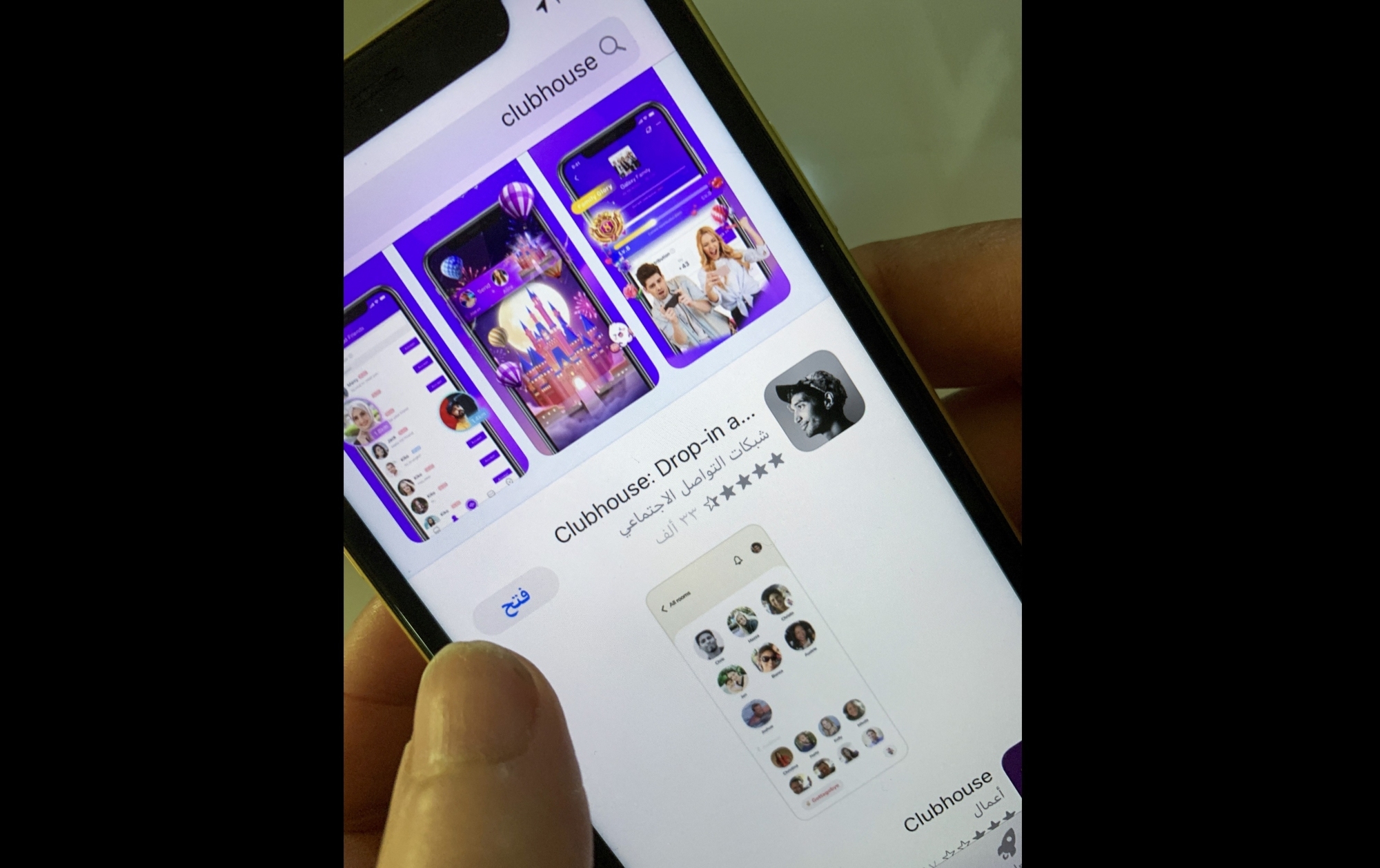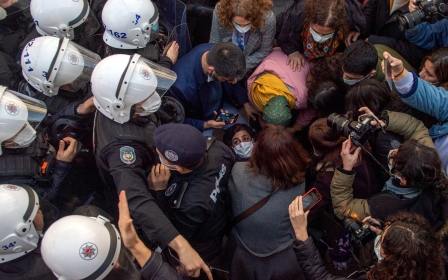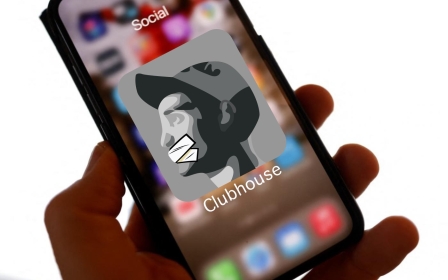Clubhouse: Can the social platform flourish in the Gulf?

Clubhouse, the new voice-only social networking app touted as a platform for fearless free speech, has faced its first interruption in the Gulf region.
Users in the United Arab Emirates have complained of "internet throttling" since early March, with full access to the app denied, in what could mark the beginning of a crackdown on the up-and-coming application.
Throttling - when service providers slow down the speed of the internet to reduce bandwidth congestion - has been used in some cases by states seeking to prevent the spread of undesirable information.
It was not immediately clear whether the UAE government directed the interruption. Clubhouse had not replied to Middle East Eye's request for comment at the time of publication.
The disruption largely went unreported because many users access the app via a virtual private network (VPN). Confirming the service interruption, a source told MEE that the audio was not clear to many users last week.
“Several people say the app is banned. That is not true. I could still log in, but I couldn’t hear anything in ‘clubs’ or ‘rooms’,” the Clubhouse user said.
Many Twitter users urged Emirati telecom companies Du, Etisalat and the state telecom regulatory authority to clarify the situation, with the latter stating on Monday that “Clubhouse is not banned in UAE”.
Rumours that Clubhouse is being interrupted because it allows free online calling are spreading, however. Most Voice over Internet Protocol (VoIP) calling apps are blocked in the UAE, leading many to access them through VPNs. The range of discussions considered taboo by most Gulf governments may also play a role.
Explosive growth
While Clubhouse is a relatively new app, it has quickly gained ground in the Gulf.
Simply put, Clubhouse is a large convention hall with a broad number of "rooms", many of which are public and can be entered by anyone. “Clubs”, meanwhile, are permanent communities built around a theme.
According to figures given to Middle East Eye by market intelligence firm Apptopia, between 14 October 2020 and 2 March 2021, Saudi Arabia recorded 220,486 downloads of the app, while the UAE saw 51,127 downloads and Kuwait 18,479.
When roughly calculated, 0.62 percent of the Saudi population, 0.51 percent of Emiratis and 0.42 percent of the population in Kuwait have downloaded the app - seemingly small rates, but far above the world average of 0.13 percent.
Saudi Arabia is a major country on Clubhouse not only in sheer user numbers, but in terms of participation. The country’s 35 million population, its longstanding societal restrictions and the kingdom’s documented tactics of platform manipulation have played a significant role in making the new social media platform attractive to its citizens.
“The audio has been a long-neglected, but long-desired, form of social entertainment,” Madeline Lenahan, Apptopia’s communications and content manager, told MEE. “The low barrier of entry (quick, drop-in chat), plus the social isolation caused by the pandemic, made Clubhouse a perfect option for casual socialisation and discussions.”
“When and where in the Gulf can more than 1,000 ordinary people gather to discuss anything? There are hundreds of chatrooms. It’s a celebration. People’s parliaments are holding sessions on Clubhouse,” editor Khalid al-Sayed wrote in the Doha Globe.
Real names, taboo subjects
Like Sayed, Qatari academic Reem al-Harmi is upbeat about the app, because it “gives space to discuss politics, religion, identity, feminism, and pop culture”. However, she says Clubhouse has yet to prove safe for users in the region.
The app’s official policy is against people using pseudonyms, and Harmi says many users are fearful of “being judged or marked for their opinion by the family, friends or colleagues”.
“Worse, there’s a fear of being recorded without the users’ knowledge or consent,” she told MEE.
Despite heated debates on taboo subjects such as atheism, homosexuality and criticism of the states, a ban on the app is unlikely, analysts say, suggesting that Clubhouse could be co-opted by the state for surveillance and control.
Mohammad al-Yousef, an independent Kuwaiti researcher active on Clubhouse, told MEE that Kuwait’s then-Minister of Cabinet Affairs Anas al-Saleh showed up on a Clubhouse “room” uninvited on 21 February.
“He just showed up and answered the moderators’ questions,” Yousef said, adding that Emirati culture minister Noura Al Kaabi also participated in a “room” earlier in February.
Harmi views such participation of “different agencies” positively, as they bypass traditional media. “I’ve seen the ministry of information in Kuwait hosting a discussion on Clubhouse, which is an important step in the right direction,” she said.
The Riyadh Bureau meanwhile reported that at least three high-profile officials - Saudi Crown Prince Mohammed bin Salman’s close aide Bader al-Asaker, communications minister Abdullah al-Swaha and Saudi ambassador to Egypt Osama Nugali - had participated in some conversations on Clubhouse.
“All Gulf states are watching political rooms,” a Kuwaiti academic told MEE on condition of anonymity, adding that Clubhouse was a venue where, “Kuwaiti, Saudi and Emirati opposition figures [in exile] are collaborating on issues they can work on together”.
While the reason Clubhouse’s use has been hindered in the UAE is unclear, at least one conversation took place on the platform last week that most likely displeased Abu Dhabi.
“There was a heated three-hour discussion hosted by Emirati dissidents on Friday,” Yousef said. “Loyalists fought with them. It wasn’t a civilised discussion. There were lots of accusations of treason and attempts to insult dissidents.”
Risk and opportunity
But not everyone has been sold on Clubhouse. Mansour al-Rugaiba, a Saudi Snapchat influencer who makes more than 18m riyals ($4.8m) a year, called Clubhouse a “disaster that tears down social values” and publicly deleted the app. His disavowal has been attributed by some media to Clubhouse’s current unfriendliness to influencer marketing and sponsored content.
While generally positive about Clubhouse, Yousef said there are lots of “low-quality, uncivilised debates along with the great ones”.
“The nature of the app gives equal access to everyone, whether uneducated, unruly or intellectual,” he said. “I heard of many unknown users whose overall goal is to ruin discussions and insult people who differ in rooms discussing sensitive topics. They behave the exact way bots do on Twitter, bashing people who question government positions.”
Even those who profusely praise the app warn of the possibility of extremist groups hijacking the platform.
Yousef cites as an example a “group of misogynists” hosting a room discussing women’s issues. “Irrespective of the widespread misogyny, Clubhouse gave women an extremely needed platform to discuss their issues the way they want,” he said. There have, though, been cases in which feminist discussions on the app have been sidetracked by people opposed to such conversations taking place at all.
“But the mere idea of having loyalists listening to dissidents in exile for hours says a lot about the possibility of accepting the dissident rhetoric - though its impact remains to be seen,” Yousef says of the debate between Emirati loyalists and dissidents.
Writing on the Carnegie Middle East Center’s website, Nael Shama predicted that the way Clubhouse is employed in the region "will become the main bone of contention between those favouring stability and those yearning for liberty”.
Middle East Eye delivers independent and unrivalled coverage and analysis of the Middle East, North Africa and beyond. To learn more about republishing this content and the associated fees, please fill out this form. More about MEE can be found here.





